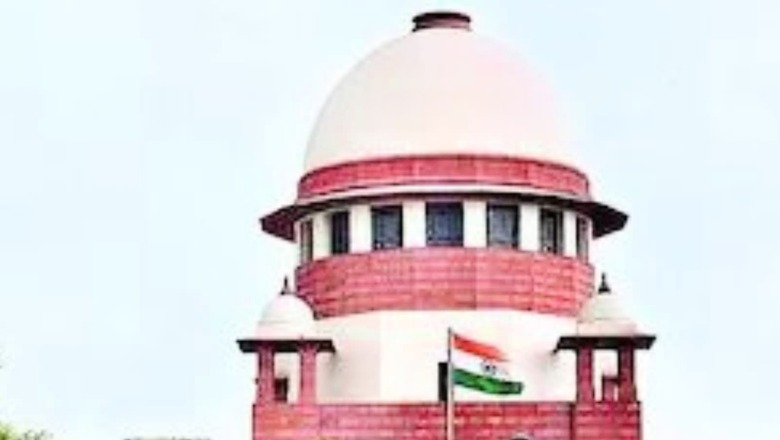
views
Supreme Court judge Justice D Y Chandrachud has said that courts in India are “extremely burdened” and “desperately congested”, and given the alarming rate of high pendency of cases, dispute resolution mechanism like mediation is an important tool.
He was delivering Justice Y V Chandrachud Memorial Lecture here on Friday after inaugurating the Indian Law Society’s ILS Centre for Arbitration and Mediation (ILSCA). The Indian Law Society has entered its centenary year.
“We are aware that the courts in India are extremely burdened, desperately congested. Both literally and metaphorically. According to the study done by PRS Legislative Research, the pendency across all the courts grew by 2.8 per cent annually between 2010 and 2020,” Justice Chandrachud said. He added that during the past two years, the pandemic and the tribulations that it brought to humankind, worsened the already alarming rate of pendency of cases.
The data available indicates that more than 4.1 crore cases are pending in district and taluka courts and approximately 59 lakh cases are pending in different high courts, Justice Chandrachud said. “As of today, 71,000 cases are pending before the Supreme Court. In view of these numbers, the dispute resolution mechanism like mediation is an important tool in increasing access to justice by providing redress and settlement of disputes in a non-adversarial manner, free from the formalistic procedural practices of the law,” he said.
He said there is no doubt that mediation has risen in prominence all over the world and certainly in India and Parliament recently introduced the Mediation Bill of 2021. “While I do not want to comment on the provisions of the bill, passionate feedback and response of various stakeholders to the provisions of the bill, clearly show that mediation as the method of dispute resolution has come of age. Even internationally, India has indicated its strong commitment to alternate dispute resolution (ADR) by becoming one of the first group of signatories to the Singapore Convention on Mediation,” he said.
The Singapore Convention on Mediation is the right step in the direction of ensuring the enforcement of international mediation settlement agreement, he said, adding, “I only hope that our country soon ratifies the convention.” Hailing the work of Delhi Mediation Centre, he said, as on July 31, a total of 2,81,474 cases of the 2,86, 631 cases fit for mediation, which is 98.2 per cent of the total, has been successfully disposed of.
While mediation is usually prominent in courts-annexed-mediation centres, community mediation, as well as private institutional mediation, are also becoming increasingly popular as more parties than ever before are opting for mediation to resolve disputes, he said. The Mediation and Conciliation Project Committee, Supreme Court of India, has undertaken steps to lay down model mediation codes, facilitate training of mediators across the country and regulate the process across all districts.
“The aim of the ILSCA, to provide hands-on experience in training and arbitration mediation to all interested participants, be it students of law, lawyers, leading businesses or legal institutes, is a cherished goal. I truly believe the future of mediation in India lies in the hands of our students,” he said. Even if mediation fails, the goal is achieved as the parties learn to listen to each other, the SC judge added.
Talking about the biases in the process of mediation, the judge said there was a need to have an understanding of the dangers that everyone needs to combat. “I think the future of mediation in India is its ability to impact social change in a manner that law does not,” he said, adding that a judicial verdict is arrived at after lawyers and judges speak in a language common people do not know nor understand.
“In contrast, the resolution arrived at invaluable discourse during mediation secures true justice for individuals and groups in their terms, in a language they can comprehend and a platform that protects their emotions and which lie close to their existence and soul,” Justice Chandrachud said. He said mediation is a tool for social change where social norms are brought in consonance with Constitutional values through the exchange of ideas and flow of information, adding that “this is the future of mediation in India”.
“As the law gets into commercial areas of life where the law has become more of a business than a profession, I think institutions like ILS still maintain that tradition of the nobility of learning, of compassion, of humanity,” he asserted. Justice Chandrachud began the lecture by sharing fond memories of his father, former CJI late Justice Y V Chandrachud and his warm association with the ILS.
The judge said his father used to speak to him about chilly winter mornings in Pune, and how he had mastered the art of coming to ILS College in the Budhwar Peth area rising his bicycle with his hands in his pocket to protect from the cold. Now, climate change has overtaken Pune, unless the National Green Tribunal does something, he quipped.
Read the Latest News and Breaking News here


















Comments
0 comment